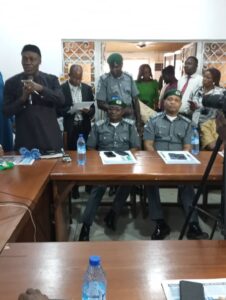
Joyce Mmereole Okoli
Stakeholders at a roundtable meeting on the proposed implementation of the International Cargo Tracking Note (ICTN), organized by the Maritime Reporters Association of Nigeria (MARAN), have unanimously agreed on the benefits of the scheme but remain divided on how it should be implemented.
The ICTN is designed to enhance cargo monitoring, boost revenue collection, and improve maritime trade efficiency in Nigeria. However, while some industry players support the government’s plan for implementation, others argue that the process lacks legal backing and could increase costs for shippers.

Representing the Comptroller General of Customs, the Coordinator of Zone A of the Nigeria Customs Service (NCS), Assistant Comptroller General (ACG) Charles Orbih, assured stakeholders that the ICTN would not burden shippers with extra costs. Instead, he emphasized that savings from reduced delays, demurrage charges, and streamlined operations would offset associated expenses.
Orbih cited **Section 28 of the Nigeria Customs Service Act, 2023**, which empowers the Service to develop and maintain electronic cargo tracking systems. He stressed that ICTN’s implementation would be phased and collaborative, ensuring stakeholder concerns are addressed.

“The Nigeria Customs Service envisions a measured, phased implementation approach. Throughout this process, we will maintain open dialogue with stakeholders, incorporating feedback and making necessary adjustments to ensure the system serves its intended purpose without creating undue burden,” he said.
Customs also highlighted successful ICTN implementation in other countries, including neighboring Ghana, as proof of its effectiveness.
The Executive Secretary/CEO of the Nigerian Shippers’ Council (NSC), Pius Akutah, represented by Director of Consumer Affairs Celestine Akujobi, reaffirmed the Council’s commitment to ICTN implementation.
Akujobi noted that the initiative was recommended by the United Nations Conference on Trade and Development (UNCTAD) and has been successfully adopted by several African countries.
“The ICTN concept is primarily a security issue. Whether the NSC or Customs implements it is secondary; what is important is that it is implemented, just as other nations have done,” he said.
Despite the endorsements, some industry experts raised concerns about the legal framework and financial impact of the scheme.
Lucky Eyis Amiwero, National President of the National Council of Managing Directors of Licensed Customs Agents (NDLCA), dismissed ICTN as lacking legal foundation. He argued that ICTN is already covered under existing customs laws, making additional implementation redundant and costly.
“You cannot operate a system without a law. ICTN is not backed by any legal framework; it is simply a scheme to generate money for a few individuals. It will obstruct the clearance of goods,” Amiwero stated.

Dr. Segun Musa, Chairman of Widescope International Logistics, described ICTN as an “intellectual fraud” and unnecessary, asserting that Customs already collects advance cargo manifests, making ICTN redundant.
“ICTN is a combination of pre-shipment clearance and destination clearance, and the key industry players will not allow a selected group of businessmen to exploit government agencies for personal gain,” Musa argued.
MARAN President, Godfrey Bivbere, underscored the importance of ICTN in improving Nigeria’s maritime sector and boosting government revenue. He noted that, beyond cargo tracking, ICTN could help monitor crude oil exports, addressing longstanding concerns about oil theft.
“Despite its benefits, ICTN has been suspended multiple times due to corruption, bureaucratic bottlenecks, and internal power struggles. It’s time for stakeholders to resolve these controversies and reach a consensus,” Bivbere stated.
He emphasized the need to learn from past failures and ensure ICTN’s implementation aligns with best practices to avoid unnecessary financial burdens on shippers.

